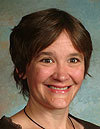
Jeanne Petit is professor of history at Hope College and a 2013 Cushwa Travel Grant recipient. Her first book, The Men and Women We Want: Gender, Race, and the Progressive Era Literacy Test Debate (University of Rochester Press, 2010), explores the ways that debates about immigration restriction in the early 20th century tapped into broader concerns about American national identity.
Petit is currently at work on a book project titled “For God, Country and Womanhood: Catholic Laywomen in World War I America.” She intends to finish before 2017, the centennial anniversary of the U.S. entry into World War I.
What originally sparked your interest in this topic?
This project emerged from work I did on my dissertation, where I examined how Catholics participated in immigration restriction debates in the early 20th century. The section on Catholics didn’t make it into the book project, but in doing that research, I became very interested in the women who were involved in the National Catholic War Council (NCWC), which later became the National Catholic Welfare Council. The War Council wanted to organize women to participate in the war effort, and after the war, they funded a series of about 20 National Catholic Community Houses, where Catholic laywomen provided housing for working women and did Americanization work with immigrants.
As I continued to research, I found that Catholic women set up visitor’s houses at military camps and over 100 NCWC women went to Europe after the war to work with soldiers and help in the recovery effort. In 1920, laywomen from across the nation came together to form the National Council of Catholic Women, which became a spokesgroup for some of the major political issues of the day, particularly protective legislation, immigration, divorce, and birth control. I became fascinated with how these women’s stories complicate our understanding of the history of Catholicism, gender, and politics in the United States.
What collections did you examine in the Notre Dame Archives?
My main research at Notre Dame involved the Diocesan and Parish History collections in the Archives and the microfilmed Catholic Newspaper collection. I wanted to gain a firmer understanding of the cities and neighborhoods in which the NCWC had their community houses. In particular, I concentrated on Milwaukee, East St. Louis, San Antonio, Cincinnati, and Baltimore.
What have been your main discoveries so far?
First, my Notre Dame research helped me appreciate the complexities of the ethnic politics in Catholic communities. For instance, when the East St. Louis community house was built in 1919, the historically Irish and German parishes had fairly stagnant to declining populations, while the much more recent Polish and Lithuanian churches were experiencing huge growth. The women who worked at the East St. Louis community house had to navigate the tensions that these changes were causing, and they had a direct effect on their work.
Second, the newspaper articles showed me how the larger Catholic population in each city saw the work of the National Catholic Community Houses. Some diocesan newspapers, like the one in Milwaukee, gave extensive coverage to the two houses that were built in that city. Other diocesan papers, like the one in Cincinnati, generally ignored the work. The type and extent of the coverage provides me with a greater understanding of the challenge the NCWC women faced as they tried to implement a national program in a specific local context.
How does your project connect to current scholarship on U.S. Catholic women in this era, and U.S. history more broadly?
I haven’t been able to find specific histories of Catholic women in the World War I era, but there is a wonderful growing scholarship about Catholic women, both religious and lay, in the early 20th century. Kathleen Cummings and Deborah Skok in particular have examined the ways laywomen navigated political and cultural currents as they built Catholic institutions. Like them, I examine how Catholic women made a case for an expanded public role for women even as they critiqued the focus on individual rights supported by the wider woman’s movement of the early 20th century.
I argue that World War I was a turning point for Catholic women. The pressures of the war compelled laywomen to rethink their relationship to their church and their nation as they became involved in war activities and post-war debates. They had to navigate modern developments, including greater racial and ethnic diversity, changing gender and sexual norms, and the growth of national bureaucracies. In the process, Catholic laywomen created a political identity that did not fit easily in the left/right political divide. They stressed communalism over individualism, women’s responsibilities over women’s rights, and religious belonging over racial equality.
I’m also interested in engaging questions about how American Catholics shaped the debate about modernity. The issues raised in the book Catholics in the American Century: Recasting Narratives of U.S. History, edited by Cummings and Scott Appleby, has been useful in helping me think through these issues.
Does teaching at a Protestant institution inform your interest in and research on Catholic topics?
I think it affects my research in subtle ways. One major theme that keeps emerging in my sources is the sense of challenge and even threat they felt from the Protestant majority. Now, at Hope College, Catholics make up a significant part of the student body, and while there are minor tensions, for the most part Catholics feel very much at home on campus. This has interested me in the question of how we went from a time of mutual suspicion between Protestants and Catholics to Catholics being an unquestioned part of the mainstream in American life and politics.